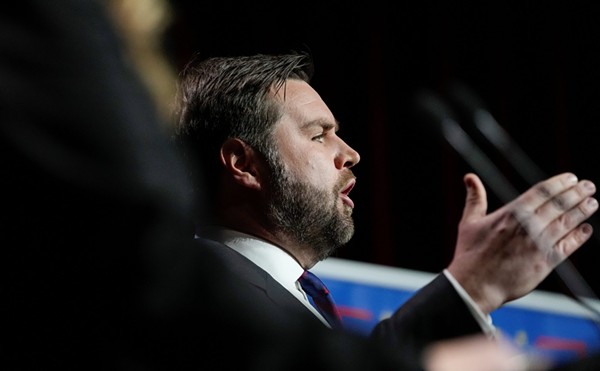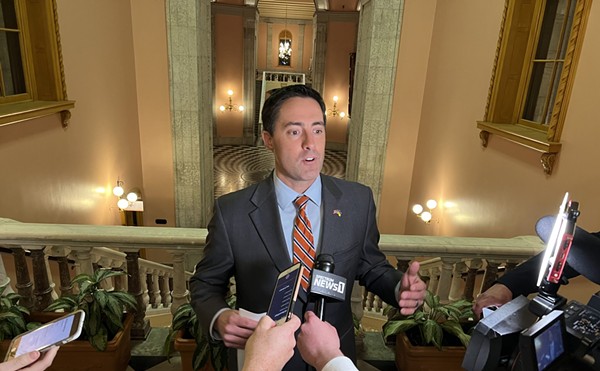Indeed, Lerner's list of good works was long enough to fill several obituaries. A self-made man who grew up in the back of his family's luncheonette, he ranked 36th on the Forbes list of the World's Richest People, with a net worth of $4.3 billion. He gave generously to his alma mater, Columbia University, and to the Cleveland Clinic, where he was treated for the cancer that eventually killed him. Most of all, he was celebrated for bringing the Browns back to Cleveland.
"I'm never going to be in the Pro Bowl," the famously private Lerner told The Plain Dealer in a rare interview last year. "I'm not going to win an Oscar, not going to be in the Canton Hall of Fame. So the closest I'm going to get is having done pretty well and being able to convert that into a legacy."
Yet in the wake of Lerner's death, relatively little has been said about MBNA Corp., the company that provided him with much of the wealth and power he used to build that legacy. Lerner, the company's chairman, took MBNA public in 1991, promptly growing it into the second-largest credit card issuer in the world, with $74.9 billion in loans and 50.9 million accounts as of last year.
Many of the company's business practices betray Lerner's good-guy image. A review of lawsuits filed against MBNA reveals a pattern of nickel-and-diming customers with policies that were quasi-ethical and, in some cases, downright illegal. The company has been sued for not properly disclosing fees, misrepresenting interest rates, and setting arbitrary deadlines for when payments must be received.
MBNA has also shown a willingness to pay off politicians to secure legislation that helps its bottom line. The company led the credit card and finance industry in political contributions and has been accused of trying to skirt campaign finance laws. MBNA has also aggressively lobbied for a bankruptcy bill that contains loopholes for the wealthy, but would strand ordinary people in debt, consumer groups say.
This, too, is Lerner's legacy.
MBNA's website boasts that it "has produced consistent earnings increases in each of the 46 quarters since it became a public company." But Robert Manning, author of Credit Card Nation, one of the most comprehensive books on the industry, says MBNA's profits reflect its skill in miring its customers in debt.
Statistics show the average MBNA cardholder carries $1,472 in debt, compared to $987 for Capital One customers, Manning says. MBNA's "success has been to get people into debt, unlike, say, Capital One, which is more cautious about how much credit they will offer a client . . . This is a den of thieves, and that's how they got to the top 10."
Take the case of Sharon Pfennig, a Columbus woman who sued MBNA in 1999, claiming the company didn't properly disclose finance charges as required by the Truth in Lending Act.
Pfennig charged a $200 purchase to her credit card. At the time, the card was issued by Household Credit Services, but MBNA later bought Household's portfolio and continued the practices that led to Pfennig's suit.
Pfennig didn't realize the purchase would take her $100 over her $2,000 credit limit, her lawyer says. But the company let the charge go through anyway. When she got her monthly statement, she discovered she was being charged a $29-per-month penalty for exceeding her limit.
Because she couldn't afford to pay off the quickly mounting charges, the interest and over-the-limit penalties drove her debt to $2,700 within about two years. (Pfennig, who now lives in New York, did not return phone calls requesting comment.)
Pfennig called Sylvia Antalis, a Sandusky lawyer, who filed suit in federal court in Columbus. Pfennig lost, but appealed to the Sixth Circuit Court of Appeals in Cincinnati, which ruled that the $29 fee should have been disclosed.
If MBNA had added the $29 fee into the finance charge, as federal law requires, the interest rate would have been upwards of 50 percent, says Antalis, who estimates that the practice affected more than 10,000 customers. "The finance charge would be so much that no reasonable person would keep the credit card; that's why they don't disclose it."
MBNA is expected to appeal, and Pfennig hasn't yet recovered any money. Either way, Antalis already sees a victory: "Even if she gets not a dime out of this, the practice will have changed."
MBNA paid a steeper price to settle a class-action lawsuit brought by Andrew Spark. The Florida lawyer sued in 1996 on behalf of people enticed to take loans or transfer debt to MBNA, based on a promise of low interest rates.
After accepting the offer, Spark used his MBNA credit card to make purchases. But when he tried to pay off the high-interest debt from those purchases, MBNA applied his payments to the low-interest loan.
Essentially, by accepting MBNA's offer, Spark made it harder to pay off his high-interest debt. "I felt deceived," he says.
In researching the case, Spark's attorney says, he discovered that even customers who never racked up new debt fell short of the promised savings by about $7.
It doesn't sound like much, but considering this involved 1.8 million customers, MBNA cashed in to the tune of $12.6 million.
The company settled the suit, agreeing to pay each person $3.57 -- roughly half of each customer's damages -- for a total of about $6.4 million, plus legal fees. The company denied liability, but didn't act like it.
"What we sued them on was deceptive advertisements they made," says James Latturner, the Chicago lawyer who represented Spark. "Well, as soon as we sued them, they changed the wording of their advertisement, and everybody else did, too."
MBNA would be sued again in February 2000, but by then, the company had found a way to wriggle out of defending itself in court.
Jason Lloyd, a California firefighter, sued MBNA for not crediting payments until the day after they arrived.
MBNA set a 6 a.m. deadline for when payments had to be received (it was later moved to 10 a.m.). It all but guaranteed that every payment received wouldn't be posted until the next day, allowing MBNA to accrue an extra day's interest, plus penalties if the delay made the payment a day "late," the suit alleged.
"Most people's damages are probably very small; you're talking about one extra day's interest on that money," says Lloyd's lawyer, Gretchen Carpenter. " [But] you're also talking about millions of customers."
Just weeks before the suit was filed, however, MBNA sent a notice to customers instituting a mandatory arbitration clause. Unless they read the fine print and opted out, they gave up their right to sue.
In theory, arbitration can be beneficial to customers, because it's often faster and cheaper than going to court. Yet it also protects companies from class-action lawsuits and whopping punitive damages, awarded by juries who want to send misbehaving executives a message.
"In my mind, it is so obviously unconscionable what [MBNA's] trying to do, because the entire purpose of that arbitration provision is to insulate themselves from individually small claims," says Carpenter.
Carpenter knows firsthand how expensive arbitration can be. To win a $29 claim against Discover Bank, one of her clients had to pay more than $1,000 in arbitration costs. He got his $29 back, plus the arbitration costs, but it was hardly worth the financial risk.
The American Arbitration Association, which bills itself as "the world's leading provider of conflict management and dispute resolution services," recently enacted rules stipulating that no consumer should be charged more than $125 for claims less than $10,000. But even Richard Naimark, the senior vice president of the AAA, has reservations about the effect arbitration will have on class-action lawsuits.
"It's a legitimate concern," he says. "The issue as to whether you can have a class action when there's arbitration is undecided. The courts are starting to grapple with it. I don't know what the answer is."
Christopher Peterson, a consumer attorney for the U.S. Public Interest Research Group, a coalition of nonprofit advocacy groups, says arbitration erodes access to the courts and lets companies write their own ground rules, including instituting gag orders.
"It's a way that corporations can create their own private, secret, corporate justice system," he says.
"The biggest problem with MBNA," says Ed Mierzwinski, a spokesman for U.S. PIRG, "is they're one of the most politically aggressive companies I've ever seen, and they're largely responsible for pushing the bankruptcy bill."
The bill, the most sweeping overhaul of bankruptcy law in two decades, would undoubtedly be a boon for MBNA and the rest of the financial industry, which has long complained about a rise in consumer bankruptcies.
In the past year, bankruptcy filings ballooned to more than 1.5 million -- a new record. Consumer bankruptcies accounted for 97 percent.
About 7 out of 10 were filed under Chapter 7, which exempts people from having to pay off most of their unsecured debt, such as credit cards. It's known as a "fresh start," since the overwhelming percentage of bankruptcies are due to major illness, job loss, and divorce.
As it stands, a bankruptcy judge or a private attorney appointed by the Justice Department determines whether someone qualifies for Chapter 7. The new bill would apply a means test. If debtors are deemed to have enough income to pay back either $10,000 or 25 percent of their debt over five years, they would be barred from entering Chapter 7.
"It's a cold-blooded financial proposition for [MBNA]," says Travis Plunkett, the Consumer Federation's legislative director. "They cloak it in the rhetoric of financial responsibility, and this is where their hypocrisy really starts to surface."
In many respects, it's an attempt by credit card companies to protect themselves from their own practices. Even as they lobbied for bankruptcy legislation, they were aggressively pursuing ever-riskier customers, who were likely to default on their loans.
"Their underwriting was not really up to snuff, if you ask me, and this is coming back to haunt them now," says Linda Sherry, a spokeswoman for Consumer Action, a nonprofit advocacy organization. "They were sending credit card solicitations to dogs and birds and all kinds of people that don't exist."
MBNA leads the industry in "affinity marketing" -- credit cards featuring a customer's alma mater or favorite sports team. Many are issued to college students or recent grads with little or no income.
One college student received an MBNA solicitation offering a $100,000 credit limit, according to the Montreal Gazette. An MBNA spokesman later told him it would be "highly unusual" for any student to be eligible for a credit limit over $2,000, but that "sometimes things slip through the cracks."
MBNA and other credit card companies claim bankruptcy abuse is rampant, but studies by Harvard Law School Professor Elizabeth Warren show that 90 percent of bankruptcies are filed by people who get sick, laid off, or divorced.
"These are by and large people who have very little," says G. Christopher Myers, a Cleveland bankruptcy lawyer who represents both creditors and debtors, and who serves as adjunct professor at Case Western Reserve School of Law. "The people that you read about in the paper are the Ken Lays, who are trying to protect a million-dollar house."
And under the most recent version of the bill, the Ken Lays of the world would keep their mansions. The bill preserves so-called homestead exemptions.
"It's disparate treatment," says Mierzwinski. "If you want to keep your home, you have to be totally paid up on it. The millionaires are going to be able to game the system because of this loophole. But the low- and middle-income consumers aren't going to be able to keep up the payments, and they're going to lose their house."
The GOP's big win on election day, plus the death of the bill's most strident opponent, Senator Paul Wellstone (D-Minnesota), leaves the bill all but a lock for passage next year. For that, MBNA can take a bow.
The company led the finance sector in campaign donations for the 2001-2002 election cycle with $1.1 million. That's more than twice as much as American Express and four times as much as Visa. And while those companies spread their payments relatively equally between parties, MBNA gave 80 percent to Republicans.
"They've been trying to buy this bankruptcy bill, because it means a lot to their bottom line," says Mierzwinski. "They pick the little credit unions up, and they hold them up like shields in front of them, but MBNA is the lead."
The company's political action committee, workers, and relatives were the biggest contributor to George W. Bush's 2000 presidential campaign, donating $240,675, according to the Center for Responsive Politics, a Washington, D.C. campaign watchdog group.
"It was a pretty big story that this new president had gotten a lot of money from special interests, but the biggest special interest that gave him money wasn't some oil company; it was this bank," says Mierzwinski.
The contributions may be why Lerner was named to the President's Foreign Intelligence Advisory Committee, despite having zero experience in the spy trade. "It's pretty common practice for presidents to appoint generous contributors to advisory posts and ambassadorships," says Steven Weiss of the Center for Responsive Politics. "It's a form of payback."
Perhaps MBNA employees made their donations under the thesis that what's good for MBNA is good for them. That's how one former employee characterized it on NPR's Talk of the Nation.
"I can tell you that the management . . . and the employees there in general are very loyal to the corporation," she said. "There is a pretty good -- I don't know what to call it, necessarily -- I guess an information network about upcoming legislation."
But the company's contributions have come into question in the past. In 1994, top executives sent a memo telling employees how much they should donate to which candidates, according to The News Journal of Wilmington, Delaware, where MBNA is headquartered.
That's common at large corporations. But the memo also required underlings to submit photocopies of the checks and tell bosses if they decided not to contribute, which may violate campaign laws. The Federal Election Commission never investigated, because no formal complaint was filed.
MBNA has also favored Ohio politicians with big donations. The company was the top contributor to the campaigns of senators Mike DeWine and George Voinovich for the 1997-2002 election cycle, giving them $48,800 and $92,500, respectively.
DeWine, in particular, has played a key role in the bankruptcy legislation. He was on the conference committee trying to reach a compromise between the House and Senate.
"If DeWine had decided to oppose the bill, he could have upset the apple cart," says the Consumer Federation's Plunkett. "He could have kept it from passing single-handedly. He's been a key player from the get-go."
Spokeswomen for both DeWine and Voinovich deny that MBNA's campaign contributions had any effect on their support for the bill.
"I don't know and he doesn't know off the top of his head who his biggest contributor is," says Amanda Flag, DeWine's spokeswoman. "People give him money all the time. He doesn't know why they give him money."
"The senator never bases his votes on contributions," says Kelly Fitzhugh, Voinovich's spokeswoman. "Anybody who knows him knows that. He annoys people on both sides of the issue, whether they contribute or not."
But to Larry Noble, the executive director for the Center for Responsive Politics, the denials are disingenuous. "They all say that," he says. "It's hard for them to deny that they're not aware of who the big givers are when the lobbyist comes to the door. These businesses are bottom-line businesses. They're giving money for a reason . . . They do it because they think they're going to get results."
One MBNA "donation" has raised questions about whether the company tried to skirt campaign laws.
In July, The Washington Post reported that MBNA gave a $477,500 home-refinancing package to U.S. Representative James Moran Jr., a Virginia Democrat who was nearly $700,000 in debt and juggling two dozen credit cards. MBNA gave Moran an interest rate that saved him about $800 a month over what he would have paid if he got the average rate for a high-risk borrower.
The Post showed the information to Frank Raiter, a residential mortgage lender, without telling him the borrower's identity. "This loan was the worst," Raiter said. "Whoever granted this loan gave this person an incredibly good deal. The person must have had extenuating circumstances for the lender to say, 'I want to do this loan' at that rate."
The extenuating circumstance may have been Moran's support for the bankruptcy bill, says David Kendrick, a spokesman for the National Legal and Policy Center, a watchdog group that filed a complaint with the Federal Elections Commission.
"It looks like he may have sold his vote for a campaign contribution," Kendrick says. "This is essentially a way for [MBNA] to get around the campaign finance laws."
In life, Lerner guarded his privacy zealously. He granted few interviews and fought The Plain Dealer's request to see his house plans that were deemed public records.
MBNA may have learned its PR strategy from its late chairman. The company rarely responds to requests for comment if the subject might put MBNA in a bad light.
When Scene called, spokesman Brian Dalphon seemed to be under the impression that he was being interviewed for a puff piece about Lerner. When asked about the bankruptcy bill, he was surprised, but managed a boilerplate answer: "It's good for consumers."
Then why do so many consumer groups oppose the bill?
"They look at it differently," Dalphon said.
He then abruptly put the reporter on hold for several minutes. When he got back on the line, he said, "There's an issue here. Something completely unrelated to your article."
He promised to call back. He never did. He also failed to return several follow-up calls. Apparently, MBNA doesn't want Lerner to be remembered for its business practices, either.












